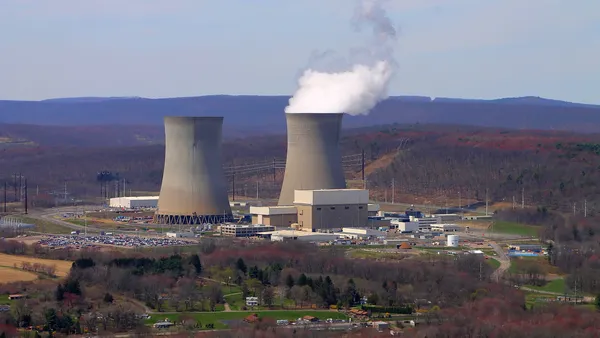Dive Brief:
-
The PJM Interconnection’s wholesale energy and capacity markets are competitive, but face a growing threat from of out-of-market solutions and subsidies such as zero-emission credits (ZECs), according to the most recent State of the Market Report from Monitoring Analytics, PJM’s market monitor.
-
The report says that the “market paradigm” and the “quasi-market paradigm” of generation subsidies are mutually exclusive, and that the quasi-market paradigm will skew market outcomes and, once implemented, will make it “virtually impossible” to return to a competitive market.
- Monitoring Analytics argues that PJM’s current protection against noncompetitive offers, the minimum offer price rule (MOPR), needs to be expanded to include existing generating units, as well as new generation, immediately.
Dive Insight:
Subsidies, or out-of-market solutions, have been a topic of discussion in PJM for many years, but the debate is heating up with the spread of zero-emission credits for nuclear plants.
Late last year, Illinois passed a bill that will provide $235 million a year to two unprofitable Exelon nuclear plants. A similar subsidy was approved by the New York Public Service Commission and is now facing legal challenges.
Connecticut is now proposing a subsidy for its sole nuclear plant, and FirstEnergy is preparing to propose a ZEC for its struggling nuclear plants in Ohio.
“Subsidies are contagious,” Monitoring Analytics wrote in its State of the Market Report.
The report argues that external subsidies “threaten the foundations of the PJM capacity market as well as the competitiveness of PJM markets overall.”
The report says that subsidies ignore opportunity cost and in doing so suppress energy and capacity prices and thereby limit incentives for investments more efficient plants and new technologies. The report argues that those impacts are long lasting but “difficult to quantify precisely.”
The preferred approach to achieving a policy goal, such as limiting carbon dioxide emissions, would be the implementation of a carbon price, according to the report, which argues that a carbon prices would “let market participants respond in efficient and innovative ways to the price signal rather than relying on planners to identify specific technologies or resources to be subsidized.”
Supporters of the ZEC policies say they are essential to value the non-carbon attributes of nuclear generation in the absence of a robust carbon price. Retiring plants would likely be replaced largely by natural gas generation, they argue, contributing to climate change and threatening state emissions goals.
The PJM market monitor's report comes as a variety of stakeholders call on the Federal Energy Regulatory Commission to address ZECs and other around-market issues. FERC will hold a technical conference on state generation supports May 1-2 in Washington.














